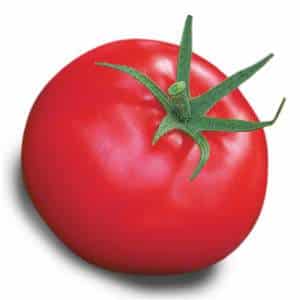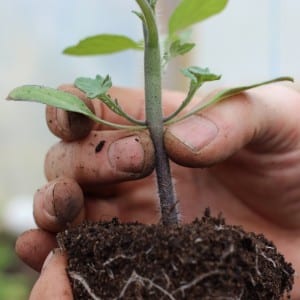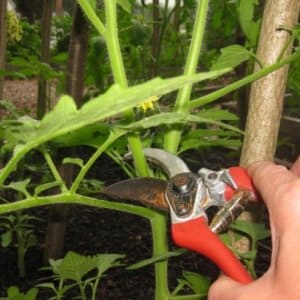Tomato “Aphrodite f1”, beloved by gardeners in all regions of the country: reviews, advantages and disadvantages of the variety
Tomatoes are rightfully considered one of the most favorite crops of Russian gardeners. Every year new varieties and hybrids with improved characteristics appear, and the ripe fruits on the bush themselves even look elegant and literally become a decoration of the beds on the site. The taste of tomatoes is also excellent in salads, in pickles, and in the preparation of all kinds of sauces. But there is no limit to perfection.
Recently, Ural breeders developed a new hybrid Aphrodite f1, which gardeners immediately fell in love with for the beautiful appearance of the fruit (hence the name), unpretentiousness and early ripening even in the conditions of the Urals and Siberia.
Description of the f1 hybrid
 Tomato Aphrodite belongs to determinant, that is, they have restrictions on the growth of the bush. Usually in this tomato they do not exceed 70-75 cm, but in greenhouses and in favorable climatic conditions the bushes sometimes grow up to one and a half meters.
Tomato Aphrodite belongs to determinant, that is, they have restrictions on the growth of the bush. Usually in this tomato they do not exceed 70-75 cm, but in greenhouses and in favorable climatic conditions the bushes sometimes grow up to one and a half meters.
The hybrid is an early ripening hybrid; 70-80 days pass from the time of planting the seedlings to the full ripening of the fruits. These plants take root well not only in the greenhouse and in the open ground.
Some enthusiasts successfully grow Aphrodite even on the balcony, although the fruits there are a little smaller.
Fruit characteristics and yield
Each inflorescence ripens 5-6 tomatoes, their average weight reaches 100 g.In greenhouse conditions, a yield of 17 kg per 1 sq. m is recorded; in areas with open ground it is slightly less, on average about 10 kg, but still considered high.
The distinctive qualities of the fruit are as follows:
- they ripen together and quickly;
- The shape of the fruit is regular and round
- the pulp is distinguished by good meatiness;
- the color of the fruit is uniform, rich;
- the skin of the fruit is strong and almost never cracks;
- There are no foreign yellow spots around the stalk, the fruits always look great;
- contains many useful vitamins and minerals, but is practically devoid of acids, which makes it suitable for dietary nutrition;
- the taste of tomatoes is sweet and attractive;
- The resulting tomatoes can be used in cooking in any form.
How to grow strong seedlings
Before planting seeds in the ground for growing seedlings, it is recommended to take certain measures.
Seed preparation
First put them in a weak saline solution, to which you can add a little potassium permanganate for disinfection. After 10-15 minutes, some of them will float up, while the rest will remain at the bottom of the container. Those that float are unsuitable for landing.
Now let’s check the seeds for germination, this procedure is also very important. This is done like this:
- place some seeds on a piece of paper;
- roll the sheet of paper;
- Place the roll in a very small amount of water so that it just wets the bottom;
- in about a week, signs of seedlings will already appear;
- if germination is less than 50%, it is better to refuse such seed.
Next, the planting material is pelleted. There are special nutrient mixtures with which it is recommended to coat the seeds.
The simplest method of mixture: the necessary mineral fertilizers and other components are added to the solution of polyacrylamide and mullein to enhance growth. Planting material is processed with it.
Before planting directly in the ground, the seeds are warmed up a little.
Container and soil
Practice shows that for planting tomato seeds for seedlings, a mixture of soil, humus and compost, which are mixed in equal proportions, is best suited. Potassium sulfate, superphosphate and ash can be added as nutritional supplements.
Important! It is necessary to prepare such a soil composition in the fall. If you are going to plant seeds in special boxes, during the winter they should be placed in the yard or at least on the balcony. There the soil will freeze and microorganisms harmful to plants will die.
The acidity of such a composition is of great importance. Tomatoes grow very poorly in acidic soil.
As for containers for planting, special boxes for growing seedlings are most often used. They can be purchased at the store or made yourself. Boxes come in plastic and wood. At first glance, wooden ones should be preferable - after all, they are a natural material. But The porosity of wood helps not only seedlings to develop well; these properties are also favorable for various microorganisms, including those harmful to plants.
Today, some gardeners plant seeds in special peat cups, where each plant develops separately. The advantages of this method include, first of all, the absence of a picking procedure.Plus, the pots are planted together with the plant in a timely manner directly into open ground, where the peat shell of the cup gradually dissolves under the influence of moisture, and the root system of the plant develops unhindered.
If it is not possible to purchase peat cups, plastic cups with a volume of 0.5 ml are also quite suitable for tomatoes. Naturally, cups are not planted in open ground with this method, but the seedlings are sent to a hole in the garden bed along with the lump of earth into which they began to develop.
However, growing in cups requires constant monitoring of soil moisture. Seedlings sometimes dry out from lack of moisture if the soil in the cups is heavily compacted, or the root system begins to rot from overly active watering.
Sowing seeds
The sequence of actions here is as follows:
- drainage is poured into the bottom of the box; it could be expanded clay, small stones or even eggshells;
- then soil with a volume of 2/3 of the container is laid;
- the soil needs to be well watered with warm water;
- grooves 0.5 -1 cm deep are made in the soil;
- seeds are planted there at a distance of 1-2 cm;
- the grooves are carefully covered with earth and sprayed with water;
- Cover the container with glass or plastic film and place it in a warm place.
After 7-8 days, shoots will appear, then the film or glass can be gradually removed, but not immediately; it is better to stretch the process over 5-7 days, first opening the crops only for a while.
Growing and caring for seedlings
After the first shoots appear (and they can be very active in Aphrodite), you need to be especially careful. If the soil is too dry by removing the film or glass too quickly, the plants will quickly die.
But if watering will be excessive, the result will also become negative, the root system will become rotten.
It is better to water sprouts that have not yet formed at the very root; it is preferable to do this at first using a syringe. But the already strong sprout of this particular hybrid loves frequent watering, although not abundantly.
After the first true leaves appear on the seedlings, picking can be done.
From the very first shoots, you need to organize good lighting, even artificial lighting if necessary. The box with seedlings should be on the windowsill; be sure to make sure it is not cold.
When the sprouts reach approximately 20 cm, their trunks and root system are stronger, the foliage is well developed and the first buds appear, the seedlings can be planted in open ground.
If weather conditions do not allow this yet, transplant the bushes into a greenhouse, where Aphrodite will develop faster and become completely stronger.
How to grow tomatoes
Before planting seedlings in open ground, prepare the ground. Hybrid Aphrodite F1 prefers neutral soils; try, if possible, to determine the acidity of the intended planting site.
Good predecessors of tomato:
- cucumbers;
- zucchini,
- zucchini,
- dill.
But it is not recommended to plant this tomato next to potato plantings.
Before starting agricultural work, the soil must be thoroughly loosened.
Aphrodite tomatoes do not grow well if the bed is densely planted. For 1 square meter, 7-8 bushes are quite enough; the distance between seedlings should not be less than half a meter.
And don’t forget to immediately put up stakes for tying - the plant is developing rapidly.
Care
The agrotechnical requirements for growing this hybrid are not complicated, but they must be strictly followed:
- tomatoes need to be pruned about once a week;
- It is not advisable to leave more than 3 stems on a bush;
- feeding must be carried out regularly and in the proper volume;
- in hot weather, plants are watered every other day;
- when it is cloudy, one watering per week is sufficient;
- Weeds should be removed regularly; they interfere with the growth and proper nutrition of the crop.
Possible difficulties during cultivation
The main mistake when cultivating this early tomato (in some reference books it is even called super early) can be haste when planting seedlings in open ground.
In some regions, frosts on the soil occur even at the end of May; there it is better to keep the seedlings in a greenhouse to avoid losing all the seedlings.
Another difficulty in growing this hybrid is that it needs to be constantly formed, tied up, etc. Otherwise, the rapid development of the green part of the seedling will stop the ripening and appearance of fruits in general.
Pests and diseases
The Aphrodite hybrid has high immunity and is practically unaffected by fungal pathologies. However, these tomatoes are often affected by root rot.
And the biggest nuisance is that this tomato immediately began to be attacked by the Colorado potato beetle in large numbers, so the bushes must be constantly inspected and treated, for example, Bordeaux mixture or copper sulfate.
Open ground and greenhouse
Although in a greenhouse these tomatoes grow taller and more actively and bear fruit better, the fruits are still tastier and denser in the open air.
In addition, if greenhouses are not regularly ventilated, the hybrid has a tendency to wilt prematurely.
Advantages and disadvantages
Aphrodite has many more advantages:
- early ripening;
- the fruits have a good presentation;
- plants rarely get sick;
- agricultural cultivation technology is quite simple;
- The fruits are suitable for dietary nutrition.
The disadvantages include the following:
- sensitive to weather changes;
- requires constant garter and bush formation;
- susceptible to attacks by the Colorado potato beetle.
Collection and use of tomatoes
These tomatoes ripen almost simultaneously, already in early August, so it is convenient to pick them, as well as to prepare them. The fruits have a good presentation and, what is especially important, do not lose it during transportation.
The tomato is tasty both fresh and as marinades and pickles.
Reviews
Irina Antonovna, 45 years old, greenhouse worker: “All our products go to retail chains, we depend on sales, so we immediately felt that Aphrodite tomatoes are in great demand due to their excellent presentation.”
Andrey, farmer: “In our region, we still plant early-ripening varieties late due to the harsh climate. Therefore, for us they are akin to ordinary varieties in warm climates. It’s attractive that they resist diseases very steadfastly.”
Conclusion
Tomato varieties often bear fruit well, but often get sick and are defenseless against pests. Aphrodite F1 hybrids exhibit much greater vitality. And at the same time they also have excellent taste and attractive appearance. It remains to thank the breeders for their work.